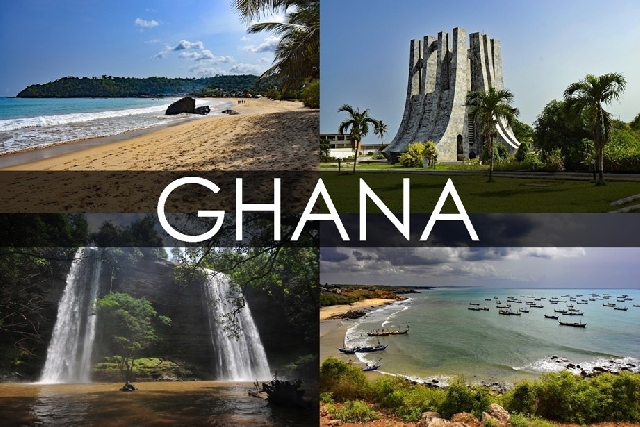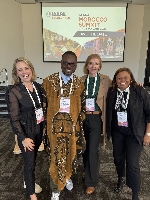Tourism revenue goes directly into economy, not into gov’t coffers – GTA as it beats pre-COVID records
 Del Report: Tourist attractions in Ghana
Del Report: Tourist attractions in Ghana
The Ghana Tourism Authority (GTA) has recounted the crippling blow of COVID-19, underlining, also, how it recovered and exceeded the pre-pandemic number of visits to Ghana.
The GTA also expressed gladness for a significant improvement in domestic tourism, emphasising the infrastructural investments which contributed to said phenomenon.
The Deputy CEO of the GTA, Ben Anane-Nsiah, and the Director of Corporate Affairs, Jones Nelson, spoke to Prince Benjamin (PB) on Class 91.3 FM’s Class Morning Show.
They dedicated time to disabusing the audience of the notion that monies coming into the country via tourism are collected government, indicating rather they are spread across the diverse parts of the economy as tourists spend physical or electronic money.
“Tourism is a multifaceted industry. And since 2019, when the Year of Return was launched, it has culminated in a lot of businesses, social cohesion, and domestic tourism has expanded,” Mr Jones Nelson noted.
“For instance, in 2019, we have the figures, we had 1.1 million people visiting Ghana, with a corresponding US$3.3 billion in revenue. Currently, as we speak, for 2023, we had the numbers being [at least] 1.15 million, as against US$3.8 billion – just last year. So you see the numbers are increasing, in terms of domestic tourism, in terms of the infrastructure, injection of the economy, etc.”
“So people think that when these monies come, they come to GTA, or directly to government,” he observed, explaining: “In economics, we have something we call the multiplier effect. So it trickles down from the hotels, to the transport services, to the restaurants, even to the cocoa seller, apapransa seller, those who sell plantain by the wayside and all of that. So if you pick transport, the transport owner will buy fuel. The fuel owner, or for instance, if you sleep in a hotel, the hotel owner will have to buy some foodstuffs, he has to pay some other bills. So the money has an injection, it goes round, it has a multiplier effect.”
He argued tourism has energised the Ghanaian economy via the creative 2019 Year of Return and ongoing Beyond the Return programmes, adding locals have been inspired to explore their homeland also.
“And if you look at the economy, since 2019, in terms of tourism, it has boosted the economy – and people have been able to realise the fact that, for instance, Ghanaians, we have realised the fact that there's the need to travel, there's the need to move places. So for instance, in terms of domestic tourism, as we speak, last year, we noticed, the numbers have increased. We have [identified] the top 10 destinations. So we have Kwame Nkrumah Memorial Park leading, and down, down, down, down, to the last of the top 10.”
Jones Nelson noted the visits of celebrities like Stevie Wonder, who is now a Ghanaian citizen, draws attention to Ghana.
“The total is 1.4 million, if you check figures for last year. So in terms of domestic tourism, the economy, it has boosted the economy. International tourism, for instance, the arrival of Steve Wonder, yes, it has put Ghana on the tourism map, that is number one. It has boosted the economy, people have been able to cash in, and then the money has a ripple effect, a multiply effect. All Ghanaians benefit from the money.”
When Ben Anane-Nsiah waded in, he buttressed the aforementioned, revealed the GTA’s tourist target and noted attention is being drawn to other parts of the country apart from the capital and its attractions. He also advocated for an increasingly digitalised economy to improve data collection.
“Definitely, we are a government agency, a government department. We are funded primarily from the consolidated fund. And so revenues to government is what is disbursed to everybody. So if the kitty grows, our needs and the vote of the body that we get becomes also quite considerable. So definitely, I mean, as the bigger pie is cut, you also get a bigger portion. But like he was saying, everywhere in the world, and it's not just Ghana, the usual way of computing is to look at the average spend per tourist, you know, because if the society is not highly digitalised, it's difficult to capture the exact amount every potential tourist or tourist is spending at every interface, every point along the value chain,” he said.
Indicating tourists are currently choosing to stay longer in Ghana, he reminisced on days the tourism value chain suffered even during end-of-year festivities, and touting this all changed due to the salvific Year of Return, December in Ghana, and Beyond the Return initiatives, he disclosed plans to revolutionise Easter and Summer times in Ghana.
“But we've noticed that the average length of stay for tourists is grown from like 10 days – average means [in] some [cases it could be] more – but now we are doing like 17 days. People are staying longer. And then if you compare to about, say, before Year of Return, the December period was very, very empty for most hotels. They all, the expatriate guys are gone, it's quiet. So it's like everybody's just waiting to go to church. But we deliberately created the buzz around December such that now we can confidently say that the entertainment hub of West Africa in December is Ghana,” the GTA Deputy CEO said.
“So we have the December period, then we have the traditional summer holiday when people come. And then now we are also pushing to make the Easter period very, very dynamic. You go to the Volta region, you go to other parts, because we want to spread the activity around the entire country.
“And the December activities are also being pushed out. I mean, if you go to Takoradi, for example, Takoradi Bronya (Christmas) is a big thing. So we want – the masquerade and everything [highlighted] – I mean, the different parts of the country must also get into the loop with people having a more varied and diverse experience. So that is helping.”
The Achimota alumnus noted, “COVID was a big blow and not to us only. From a high of 1.1 million, we [dropped and] had 355,000 at the end of December. And remember the first three months [of 2020], that's when the lockdown came and all of that. And then we climbed gradually up to 623,000, then 914,000, and now we've surpassed the pre-COVID level.
“But we have, as a country, a target of 2 million arrivals. We actually wanted it by 2026. COVID disturbed the trajectory a little. But from [how] we're going, we would get. Even if we don't get there, we would get close. And what is even more exciting is that the numbers of people who are moving around domestically are also increasing, fueled by some investments we've done.”
Explaining, he said: “Certain sites have been upgraded. You've seen the Kwame Nkrumah Memorial Park, You've seen Kintampo waterfalls. There are some things that are being done in Pikoro in the north, in Salaga, in Tafi Atome, and so on, so that when people go to these domestic tourist sites, they must have value-for-money experiences. Because you see, a dollar is money, but so is a cedi. You know? And the more people move around, the more we spread the revenues, the more we inject certain resources into the local economy and the benefits are spread in a way that is more direct. So the tourism, it will continue.”
Trending Entertainment

2025 AdinkraFest set for July 24 to 26
15:56
IAAPA AAVEA Africa Summit 2025: Industry leaders urged to champion social reconnection through tourism
08:50
Okyeame Quophi debunks domestic violence rumours, reveals real cause of wife’s ‘bloodied eye’
03:51
'If you had a good marriage, you’d understand my wife takes care of me': Sam George shades critics
15:42
BTS stars finish military service as band plans to reunite this year
14:05
Mabel Okyere on how 'Gospel is free' perception cripples Gospel musicians
13:53
Sly Stone, pioneer of early funk music, dies after 'prolonged' battle with illness
19:36
Kobby Kyei wants gov't to 'mute' and 'amplify' people on social media
14:30
Amerado sees hope in Ghana music filling stadia worldwide, cites Black Sherif
14:07
Do Gospel musicians use drugs, too? – Epixode debunks creativity-enhancing use of drugs
04:01




